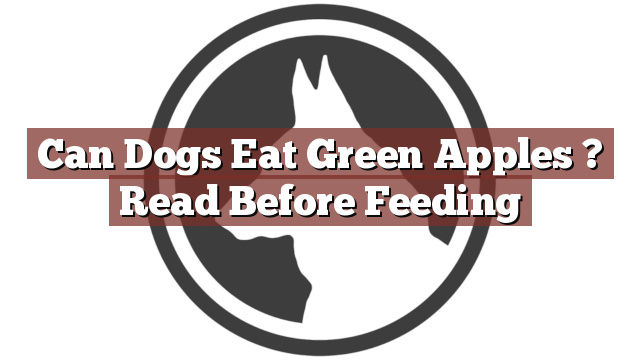Understanding Your Dog’s Dietary Needs
As a responsible pet owner, it is crucial to understand your dog’s dietary needs to ensure their overall health and well-being. While dogs are omnivorous and can digest a wide range of foods, not all human foods are safe for them to consume. Therefore, it is essential to be aware of what foods are safe and beneficial for your furry friend’s diet.
Can Dogs Eat Green Apples? Read Before Feeding
Can dogs eat green apples? This question often arises among dog owners who are curious about introducing this fruit into their pet’s diet. The answer is yes, dogs can eat green apples, but with certain precautions. It is important to remember that moderation is key when it comes to feeding any human food to your canine companion.
Green apples can be a healthy and nutritious snack for your dog due to their high fiber content, which can aid in digestion. However, it is crucial to remove the seeds and core before feeding the apple to your dog. Apple seeds contain cyanide, which can be toxic to dogs if consumed in large quantities. Additionally, the skin of the apple may be difficult for some dogs to digest, so peeling it is recommended.
Pros and Cons of Feeding Green Apples to Your Dog
Feeding green apples to your dog has its pros and cons, which you should carefully consider before incorporating this fruit into their diet. On the positive side, green apples are low in fat and calories, making them a healthy snack option for dogs who need to maintain a healthy weight. The high fiber content in green apples can also help regulate your dog’s bowel movements and promote a healthy digestive system.
However, there are a few potential drawbacks to be aware of. Some dogs may have sensitive stomachs and may experience gastrointestinal upset if they consume green apples. Additionally, the natural sugars present in apples can cause an increase in blood sugar levels, so it is important to feed green apples in moderation, especially for dogs with diabetes or weight issues.
Conclusion: Considerations for Feeding Green Apples to Your Canine Companion
In conclusion, green apples can be a safe and healthy treat for your dog when given in moderation and with certain precautions. Before introducing any new food into your dog’s diet, it is always recommended to consult with your veterinarian, especially if your dog has any pre-existing health conditions.
Can a dog eat green apples? Yes, they can, as long as you remove the seeds and core, and peel off the skin. However, it is important to monitor your dog’s reaction to the fruit and ensure that it agrees with their digestive system. Remember, every dog is unique, and what may be suitable for one dog may not be suitable for another.
By understanding your dog’s dietary needs and making informed decisions, you can provide them with a balanced and nutritious diet that supports their overall health and well-being.
Thank you for taking the time to read through our exploration of [page_title]. As every dog lover knows, our furry friends have unique dietary needs and responses, often varying from one canine to another. This is why it's paramount to approach any changes in their diet with caution and knowledge.
Before introducing any new treats or making alterations to your dog's diet based on our insights, it's crucial to consult with a veterinarian about [page_title]. Their expertise ensures that the choices you make are well-suited to your particular pet's health and well-being.
Even seemingly harmless foods can sometimes lead to allergic reactions or digestive issues, which is why monitoring your dog after introducing any new food item is essential.
The content provided here on [page_title] is crafted with care, thorough research, and a genuine love for dogs. Nevertheless, it serves as a general guideline and should not be considered a substitute for professional veterinary advice.
Always prioritize the expert insights of your veterinarian, and remember that the health and happiness of your furry companion come first.
May your journey with your pet continue to be filled with joy, love, and safe culinary adventures. Happy reading, and even happier snacking for your canine friend!

